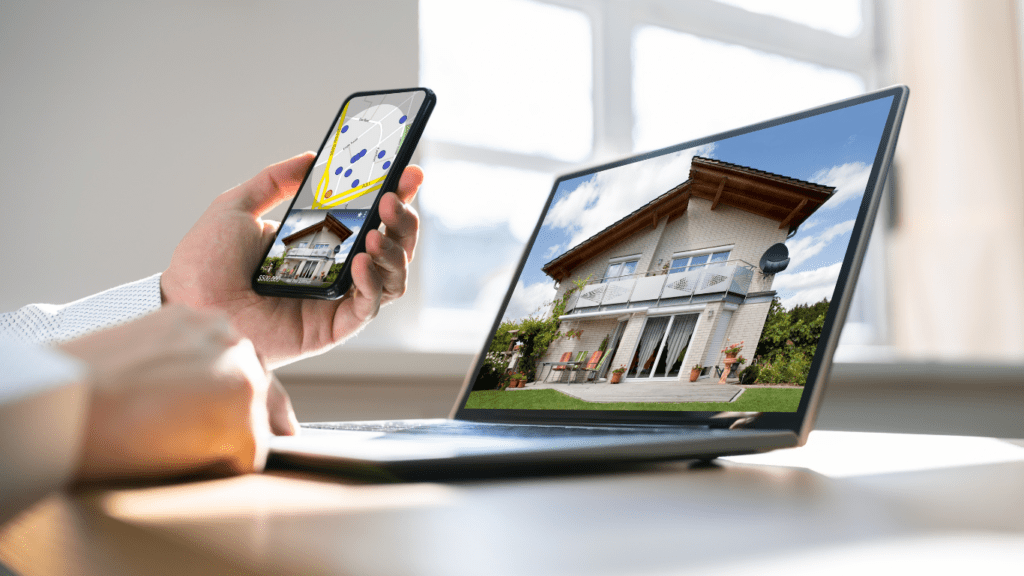The Role Of Technology In Real Estate
Technology is redefining how real estate professionals and consumers operate. Digital tools like property listing platforms enable instant access to thousands of properties, streamlining the search process. For example, platforms such as Zillow and Realtor.com aggregate property data, ensuring users can browse listings with detailed descriptions, HD images, and real-time updates.
Artificial intelligence optimizes property recommendations by analyzing user preferences and historical behavior. AI-powered tools help buyers and investors identify listings tailored to their needs, improving decision-making. Chatbots integrated into real estate websites provide 24/7 support, answering inquiries and scheduling viewings.
Virtual reality allows immersive experiences of properties without physical visits. Buyers can explore floor plans and finishes through VR headsets or interactive 3D tours, saving time and reducing logistical challenges. Augmented reality further enhances this by letting users visualize renovations or furniture placement within a space.
Blockchain technology offers secure, transparent transaction processes. Smart contracts automate tasks like payment processing and ownership transfer, reducing reliance on intermediaries. This ensures efficiency and minimizes risks, making blockchain a critical innovation for the real estate ecosystem.
Data analytics drives better market insights. Predictive analytics tools process vast amounts of data, empowering agents and developers to forecast trends, identify investment opportunities, and set competitive pricing. These insights enable stakeholders to act with greater accuracy and confidence.
Digital Innovations In Property Listings
Digital innovations are revolutionizing property listings, simplifying how potential buyers and renters explore properties. Modern tools bring unparalleled convenience and interactivity to the real estate search experience.
Virtual Tours And 3D Visualizations
- Virtual tours let users explore properties remotely, creating an immersive experience similar to an in-person visit. 360-degree views and 3D walkthroughs allow potential buyers to assess every corner of a property from their devices.
- Platforms like Matterport combine high-resolution imagery with spatial data to deliver detailed virtual presentations.
- Some listings also offer virtual staging, combining technology with interior design to showcase furnished setups.
Advanced Search Tools And Filters
Advanced search tools enhance efficiency by narrowing results based on specific criteria. Interactive filters sort properties by price range, location, square footage, amenities, and more. AI-driven platforms suggest properties aligned with user behavior and preferences. Geographic map overlays help visualize proximity to schools and transportation. With real-time updates, users gain immediate access to new listings and changes, streamlining decision-making.
The Impact Of Artificial Intelligence

Artificial Intelligence (AI) is revolutionizing the real estate industry by enhancing efficiency, accuracy, and customer experiences. AI-driven tools are reshaping how properties are valued, marketed, and managed.
Predictive Analytics For Property Value
Predictive analytics leverages AI algorithms to estimate property value with high precision. AI examines factors like location, historical pricing trends, neighborhood growth, and market demand to create data-driven valuations. For instance, algorithms process real-time data from property databases to forecast trends, helping investors identify profitable opportunities. Tools like Zestimate by Zillow provide fair market value estimates to users, aiding both buyers and sellers.
AI also detects anomalies in property pricing by comparing similar listings, ensuring fair comparisons. Agents can utilize predictive models to price homes competitively or evaluate potential appreciation for long-term gains. This technology minimizes subjectivity and allows stakeholders to make confident decisions.
AI-Powered Chatbots For Customer Engagement
- AI-powered chatbots enhance customer experiences by providing instant, automated support.
- These systems handle inquiries, schedule property tours, and assist users in navigating listings.
- Chatbots like those used by Realtor.com answer frequently asked questions 24/7, eliminating delays in customer interaction.
Natural language processing enables chatbots to interpret and respond to complex user queries, creating a more personalized experience. For example, a potential buyer might receive tailored property options based on preferences shared through chatbot interactions. This streamlines engagement and ensures prospective clients remain connected to the platform.
Blockchain And Real Estate Transactions
Blockchain technology is transforming real estate transactions by enhancing transparency, efficiency, and security. This innovative system provides a decentralized ledger, ensuring trust and accountability between parties.
Secure And Transparent Deals
Blockchain ensures secure and transparent deals through immutable smart contracts. These digital agreements automatically execute terms once conditions are met, reducing risks of fraud and human error. For example, escrow payments are securely handled without intermediaries, lowering costs while improving reliability. The blockchain ledger records each transaction permanently, ensuring traceability and eliminating discrepancies.
Simplifying Title Management
Title management becomes more efficient with blockchain’s decentralized system, which stores ownership records securely. Authenticating property titles is faster as the ledger provides all historical data without requiring third-party verifications. For instance, platforms like Propy streamline title transfers by digitizing the process, cutting down delays and legal disputes. This innovation reduces paperwork and enhances accuracy by removing redundant procedures.
The Rise Of Smart Homes
Smart home technology is redefining how properties are managed and experienced. Connected systems powered by the Internet of Things (IoT) are enhancing both operational efficiency and tenant satisfaction.
IoT Devices And Property Management
IoT devices are transforming property management by automating key tasks. Smart thermostats, like Nest and Ecobee, enable remote control over energy use, reducing costs and environmental impacts. Smart security systems, including cameras and access control devices, allow real-time monitoring and enhance property safety. Leak detection sensors notify property owners instantly when water damage risks arise, preventing costly repairs. These tools streamline operations by providing actionable insights and remote management capabilities.
Landlords use property management platforms integrated with IoT solutions to track maintenance needs and tenant communications effortlessly. For instance, smart locks simplify access control by allowing remote key sharing, eliminating physical handovers. Predictive maintenance systems, powered by IoT data, reduce emergency repairs by alerting property managers to equipment deterioration in advance.
Enhancing Tenant Experience
Smart homes improve tenant experiences through personalized and connected living spaces. Voice-controlled assistants like Alexa and Google Home enable seamless interaction with smart lighting, entertainment systems, and appliances. Energy-efficient solutions, such as smart blinds and automated HVAC systems, provide optimal comfort while lowering utility bills.
Enhanced security features, like video doorbells and motion sensors, offer tenants peace of mind by providing real-time alerts. Integrated mobile apps allow tenants to manage their environment with ease, from controlling room temperatures to scheduling package deliveries. Smart intercom systems improve visitor access, while in-unit automation features, such as scheduling lights and appliances, ensure convenience for renters.




